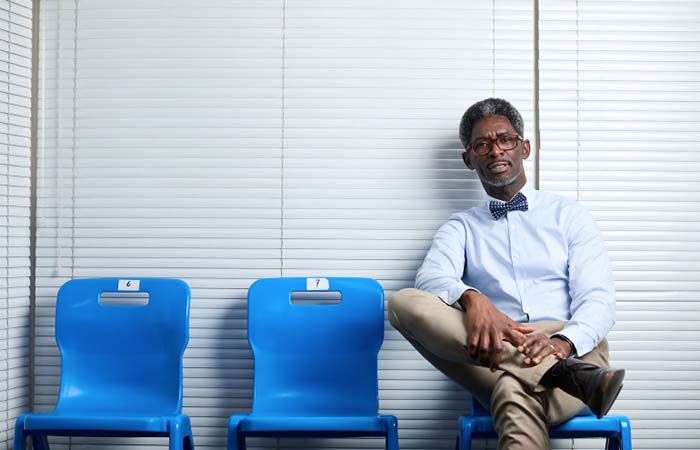Interview: 'Pharmacists aren't taught how to be entrepreneurial'
In Interviews
Follow this topic
Bookmark
Record learning outcomes
He’s a pharmacist, she’s a GP. This Essex husband and wife team say pharmacy may need to explore opportunities outside the NHS if it’s to avoid going the way of Blockbuster Video. By Arthur Walsh
When pharmacist Baba Akomolafe and his GP wife Dupe bought Christchurch Pharmacy in Braintree back in 2003, the business wasn’t doing so well: run down looking, finances in poor shape and a previous owner who had been struck off.
Another pharmacist might have looked elsewhere for their first acquisition. And if they had decided to take a gamble on Christchurch, they would probably have given serious thought to changing the name to distance themselves from its historic reputation. But Baba and Dupe had their own ideas.
“I should have run a mile,” says Baba. “But I said look, there is value here. You can make a difference.” Moreover, “we are people of faith and this is the kind of name we like as a family”.
That willingness to trust their instincts has served the Akomolafes well. Despite Baba having only spent two weeks working in the community sector before buying Christchurch, the pair set about making improvements that were soon appreciated by locals – “even the GP surgeries” sat up and took notice, they say.
Out went the muddle of notices taped to the window, as well as a counter cluttered with lollipops and over-the-counter products. In came a cleaner, stripped-down aesthetic. “We want it to look professional, not like a shop,” says Dupe.
The business has grown since they first bought the pharmacy. In the late 2000s Dupe rented a consultation room for aesthetics consultations. That has evolved to become Christchurch Health Centre, a clinic providing GP appointments and a raft of private services ranging from vaccinations to ear wax microsuction and family planning advice.
Then, a chance encounter with a fellow parishioner at their local church led to their taking on a domiciliary care agency from its owner who planned to retire. As a result, they have a presence on both sides of Braintree, providing a multidisciplinary team: GP, pharmacy and domiciliary care.
“We’ve always had a vision of running a family business and being part of a community,” they say. “A place to raise our children and build everything around the business.”
They describe themselves as health and social care entrepreneurs. Was that entrepreneurial streak always there, or did they ever have a lightbulb moment that spurred them to look beyond the day-to-day? Dupe replies: “I think we’ve always had that mentality, that awareness of not boxing ourselves in. It’s the foundation of our business.”
The pair were early adopters of automation, purchasing their first robot 14 years ago. “It was unheard of back then,” says Dupe. “But Baba insisted on it. We could barely afford it as we had just moved premises, but looking back it has been such a blessing.”
Change is coming
It’s an old truism that pharmacists tend to be risk averse. It’s a trait that comes in handy when applying their clinical knowledge in the dispensary, but it can also hold some people back, say the Akomolafes. “We were not taught to be entrepreneurial in university,” says Baba. “That’s the challenge we face as a profession.”
But in their view it is past time to face new realities. Baba recalls the presence Blockbuster video stores once had in British towns, seemingly a permanent fact of life before streaming annihilated its market. He says now it’s community pharmacy’s turn to see the writing on the wall.
For one thing, the NHS has set a deadline in the first half of the next decade for moving from dispensing to services: “There’s going to be a massive transformation needed from us to be able to serve what the NHS will request from us. There is a 10-year plan, but it might be even quicker with the Labour Party talking about shifting work from hospital to community. That means us. They’re talking about prevention versus treatment and most prevention happens in primary care. Again, that’s us.”
“The call right now is for our leaders to help us get ready sooner rather than later. GPs are already overloaded, they will turn to pharmacy.” And pharmacy needs to be prepared when that happens: “We need to increase our capability, our competence, our capacity, and then collaborate with those who are providing those services. And we need to start preparing our teams right now.”
But even assuming that a new role for community pharmacies comes with money attached to it, it’s unlikely any new injection of public funding will be enough to reverse the decline seen since 2015. That’s part of the reason private services have become such an important part of the company’s offering.
Dupe says it was a natural evolution once they realised the unique opportunity pharmacies have to capitalise on their dispensing footfall. “People come and ask for things, they moan about not getting the appointments they need. We get a feel for what they’re not getting.”
That means ideas for new services often come straight from the horse’s mouth. “We didn’t just pull a list from Google,” says Dupe. Once they’ve had a few people ask for a service, they’ll dig into nuts-and-bolts questions: “How much is it? How do we create the capacity for it? How do we get the competence for it? And do we need to collaborate with anybody to establish that service? And then we work our way towards doing it.”
They don’t decide what the most successful service will be, they say – it comes down to patient preference. Ear wax microsuction is far and away the biggest, accounting for 60 per cent of all private services in 2023 at just under 1,500 consultations. It’s followed by travel vaccinations, which comprises a quarter of private consultations. Cryotherapy, occupational vaccines and aesthetics make up the rest.
Much of their business has come through word of mouth, but they say that if and when they get more strategic with social media they expect to see an uptick, particularly for aesthetics consultations.
They also reach out to local GPs so doctors can inform patients that a service which is not available on the NHS can be accessed privately in their local pharmacy. Dupe says she recently had a travel vaccination client who had read about them on her GP’s website. “I thought, really? But when I looked at the website it said, ‘We do not provide travel vaccinations – you need to contact Christchurch Pharmacy’. I thought wow, free marketing!”
And they have had patients say outright that they chose Christchurch despite the fact a service may be available cheaper elsewhere. They are resolute on prices, arguing that services delivered to a high standard by a trained professional should not be offered at a discounted rate.
Baba says he is cautious about flying the private services flag too forcefully, “as then the NHS can turn around and say we will just make money that way”. Not to mention that the newer NHS services have been good for business, with as many as 25 Pharmacy First referrals on a good day.
But he argues that there isn’t necessarily a hard contradiction between NHS and private business. He points out that if he boosts the pharmacy’s capacity in anticipation of, say an expansion of Pharmacy First, it will serve the business whether that happens or not. “I haven’t got anything to lose. That capacity I can use for private services.”
So even if Labour’s big devolution plans don’t arrive as billed, the Akomolafes aren’t too worried.
“Private will be a secondary effect. Patients will need to go somewhere for those services, that’s what happened with ear wax removal.”
Baba explains that this started as a locally commissioned service that only grew in success after public funding was withdrawn.
Think like a taxpayer
When he speaks to other pharmacy owners, does he get the sense they are worried about a Blockbusters-style extinction event? He jokingly covers his ears and says: “They don’t want to hear it.”
He goes on: “Everyone’s looking around and thinking we’re entitled and the government needs to fix things for us. Sometimes we need to put on the hat of a taxpayer and realise that they’ve got to get value for money. There’s just not enough money to go around, so why should they pay you to do manually what could be automated for 15 per cent of the cost? From a taxpayer’s point of view it’s irresponsible.”
But there are complexities. Baba says the government is obliged to “help us automate”. “Some of us have been privileged enough to invest in automation ahead of time, but there are those who haven’t. At the moment, tight budgets mean they don’t stand a chance of doing so.” He thinks that if and when hub and spoke finally arrives it should be “done in a way that benefits everybody” including those smaller businesses that can’t afford their own robot.
Do other pharmacists ever bristle at his ideas? “Absolutely, because of how we are trained. The fear of making a mistake, the emphasis on sticking to SOPs rather than thinking outside the box. Now those things have gone overboard.
“It’s actually affecting how we approach pharmacy, which in reality is a business. Some of my colleagues might not want pharmacy to be called a business but it is. You’ve got incomes, outflows, all the things any business has. We’ve got to work to make things more efficient and productive.”
He is quick to point out that many pharmacies are out there doing innovative work but says “we need to move together and evolve together, we don’t want pharmacies to close down. They are needed and there are enough clinical services for us all to deliver”.
Confident delegation is an important element of the risk tolerance that pharmacy needs to develop. Microsuction is the key pillar among their private services, and the majority of consultations are delivered by accuracy checking dispenser Hannah, who is upskilling herself and treating a lot of satisfied customers while costing a third or less per hour than using Dupe’s time as a GP.
A weight loss service is the next big target for them. “We’ve been looking at it for a while, we really need to kick-start it.” They have been waiting for more evidence to come in on the safety profile of GLP-1 receptor agonists “but more and more it’s becoming clear that it’s changing a lot of lives and that the benefits outweigh the risks”. They’re putting everything in place for a January launch, they say.
What else are they excited about next year? Baba mentions the transfer of funding from hospital to community and hopes for an improved relationship between pharmacists and GPs – something he is working towards as a local primary care network engagement lead.
They are also looking to create more capacity through purchasing a new accuracy checking system. It’s all about having the team trained up for when new services land: “There might not be a lot of water now, but you know the rain is coming – so you buy buckets for when it does.”
And they hope the rules for Pharmacy First are loosened: “We are looking forward to being in a position where patients can select their chosen pharmacy on the triage system instead of waiting for the GP surgery to decide something is for us. If we could remove those barriers, that would be beautiful.”
“There is going to be more funding, but it’s not going to be the amount we would want or the way we want it. And there will be no increase in funding without reform. That means I need to reform if I want a piece of that cake. If I stay where I am with the same mentality I won’t be a part of it,” Baba says.
Train the team and boost capacity, he advises colleagues: “Those are the buckets that will receive the rain that’s coming to community.”
Photography by Krystian Data



